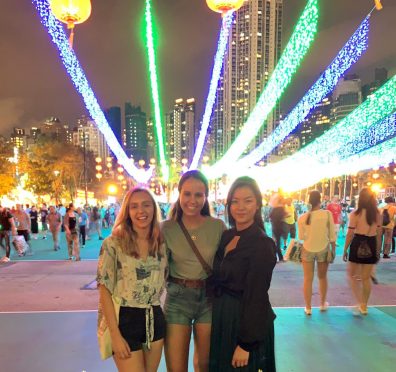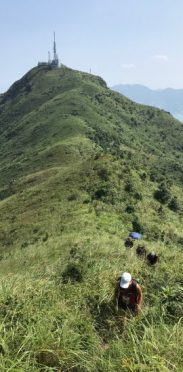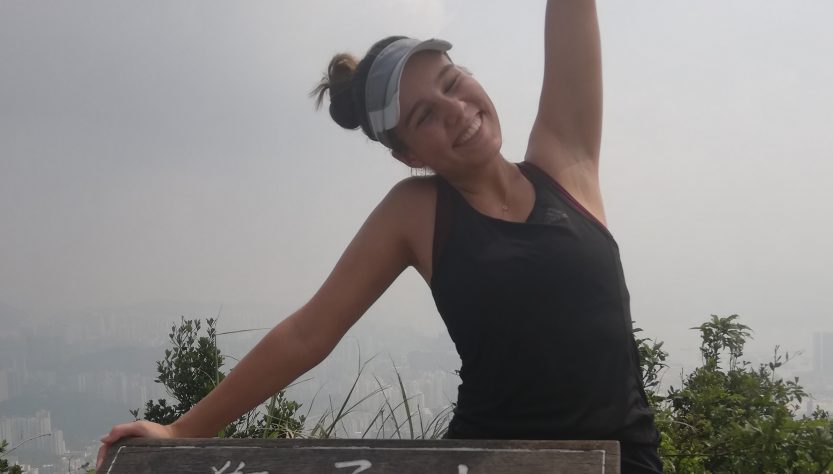Pre-departure:
I went on exchange to the Chinese University of Hong Kong in Hong Kong from August to December 2019.
I chose CUHK as I had never been to Asia before and I was looking for an east-meets-west experience to help the transition. I was also looking for an economic and travel hub, and Hong Kong ticked all those boxes. The campus is located on a mountain on the outskirts of the city and the campus looked beautiful.
The application process was very easy once you have been nominated. There were some online forms to fill out and then you just had to wait for further confirmation.
With regards to the Visa process, CUHK handles everything. They send you an email with all the documents you need to send them via post and then they send you your visa via post mail so you do not have to go to any embassy’s yourself which is very convenient.
Try keep up to date with all the details and emails coming through, as there will be a lot, and it can be difficult to sift the important information out. You will probably get a link to join a Facebook group with other exchange students which is very helpful. Also do not be afraid to reach out to the IASP team as they are very happy to help and respond very quickly.
Before I left for HK I tried to gather as much information as I could about all the small things one might forget or not know. This was very helpful so I recommend watching YouTube videos on life in general in HK and reading blog posts. Some small tips: they use a UK plug so take an adapter with you as well as a 2-prong adaptor.
Take a few things that you know will make you feel at home for the first few days while you orientate yourself. I took some coffee sachets with me, oats sachets and sweet treats. I would also recommend packing lots of cereal bars or healthy snacks; especially for the first few days as you might not know where to buy them, they are very expensive, and the variety is not huge. These were just small things that really helped me feel a sense of calmness while I was familiarising myself with this new environment.
When packing clothes, a tip I wish I had was to try and pack ‘sweat-proof’ clothes. By that I mean clothing materials that are cooling, colours that don’t show sweat and loose fitting clothes. Basics will be your best friend for your time there as it is too hot and far too humid to wear anything else. The classes end at the end of November with exams happening during December. It is common for courses to not have an exam and therefore you can be finished end of November, beginning of December but that obviously depends on your faculty and your chosen courses. The weather only starts cooling down late November. In December, DO NOT over pack winter clothes. I packed so many winter clothes that I never ended up wearing.
Experience at Host University:
It is worth noting that I went on my exchange during peak Hong Kong protests. I was assured from the South African embassy and my student adviser from CUHK that the exchange will go ahead and shouldn’t be impacted by the protests.
We were initially going to organise our own transport (everyone messaged on the Facebook group to find a buddy to take a taxi with), however, because of the protests and the fact that the airport was hit a week prior to our arrival, the University sent shuttles to take us to the university. In fact, the person I had originally planned to taxi with and the people I sat next to on the shuttle ended up being my closest friends during my stay. I should also say that nothing could have prepared me for the humidity you get hit with the second you leave the airport, and it stayed for a consistent 2 months after that.
So we arrived 26/27th of August and had a welcome program for the rest of the week. The program was optional and not intense, however, highly advised as it’s a great way to meet people. We had a welcoming dinner, where there was approximately an 8-course meal of Chinese cuisine. They also help you register for your courses within these first few weeks of classes. I went to as many classes as possible in the first week to try and gauge which courses I wanted to take.

Unless your class has a tutorial, you will have each class once a week for 3 hours. This is how all the classes are structured. This was quite an adjustment and the first obvious difference to classes in Stellenbosch which are mostly 1 hour each, about 3 times per week. Once you get used to it, it’s quite nice getting that subject ticked off for the rest of the week, and they do give breaks during the 3 hours.
All of my classes had English as its primary language of teaching and all my classes were less than 50 people. This is another difference and due to the smaller sizes, class participation is highly encouraged, and voicing opinions is greatly welcomed. It is also less intimidating to ask a question. Due to the smaller sizes, the method of assessment is also different. Most of my classes had presentations, projects and essays with written learning tests being the exception.
The workload is similar to Stellenbosch in that most courses will have 2-3 assessments although from my experience, the intensity and pressure was less than that experienced at Stellenbosch. That being said, none of my courses had official exams and the exam period got cancelled during my exchange semester due to the protests.
One thing to note is that the campus is HUGE. There is a campus bus that will take you a while to figure out. There is also an MTR station at the university that is the most convenient way to reach the city.
The university is far from the city centre which has its pros and cons. It was amazing to see how beautiful the views were all over campus. On the one side you had lush mountains and on the other side there were amazing sea views. This space comes at a price as it takes a while to get to the city. It would take around 30-45 minutes on the metro to get to the city.
Although some people might only see Hong Kong as a concrete jungle, it has some incredible nature with hikes that ended up being some of my top highlights. I highly encourage getting out into nature as much as possible there, there really are so many hikes and amazing views to see. It was also a great way for me to meet like-minded people. I even went hiking and beach camping with some friends which was amazing. I also really enjoyed getting off the metro at any stop and walk around aimlessly, just soaking in as much of the culture as I could.

I didn’t feel too much pressure to travel during term time, I only went to Taiwan, as I knew I would have lots of time after the term ended to go travelling. The semester ended early due to the protests and I could complete the rest of my assignments online, therefore, I went travelling from mid-November.
Return to Stellenbosch:
I travelled for 6 weeks around South East Asia once term ended and when it was time to come home, I was ready and excited to be back with some familiarity.
After being away for so long and travelling to many places, some that are deemed to be some of the most beautiful places in the world, it really made me realise how beautiful South Africa is and how lucky I am to be able to call Stellenbosch and Cape Town my home. I also never thought I’d be so happy to hear the South African accent as I had been the only South African on exchange at CUHK.
It is definitely a process to fully reflect on your time overseas. Personally, it was very much go-go-go while away; so, it was difficult to pause and reflect on the journey, therefore I’ve taken time since being home to step back and fully reflect on my time overseas. There’s also a mixed reaction when coming home and seeing friends as some are very interested in your experience and some may not seem too interested; so, it’s been great speaking to friends who have also been on exchange so you can help each other out whilst adjusting to South Africa again and bond over your experiences together.
Overall, I am so grateful for this experience and all the things I’ve seen, learnt and the amazing people from all over the world that I’ve met.

